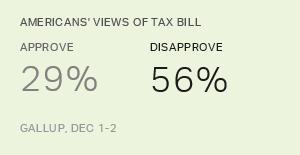Did the American people use the midterm election as a mechanism through which to express their very low levels of trust and confidence in the government and in Congress? There is scant evidence to reply "yes" to that query.
The first indicator to look at is turnout, which was at record-low levels in this year's midterm. Preliminarily, in fact, 2014 was the lowest midterm turnout since the World War II election in 1942. I discussed some of the implications of the low turnout here. The interpretation of what the low turnout means has become subject to partisan "turnout spin" -- not shocking in our highly partisan world. Republicans, having done well among Americans who did vote, are loathe to attach much meaning to the low turnout. I listened, in fact, to one Republican pollster recently who downplayed any significance of the low turnout, attributing it the lack of high-profile statewide races in large population states. On the other hand, the Democrats and President Barack Obama have attempted to play up the low turnout, hoping to downplay imputed significance of the election results by pointing out that the sentiments of over 60% of Americans who did not vote were not represented (of course, by those nonvoters' own choices).
Fundamentally, all voting-eligible Americans had the opportunity to vote for Congress in this election, meaning that every American, in theory, had the opportunity to express his or her displeasure with government at the ballot box. The significant majority of Americans did not express their displeasure in this way. It's hard to arrive at any conclusion other than that the American public, in general, did not avail themselves in any unusual way of the chance to manifest their intense displeasure with the government by getting out to vote. They did the opposite and stayed home in apparent record numbers.
What about the issue of throwing out incumbents among the minority who did vote? An analysis published by Larry Sabato's Crystal Ball website showed that this did not happen either. In fact, 96% of House incumbents running for re-election were returned to office (pending outstanding House races still being contested), along with 85% of Senate incumbents, both higher, not lower, than the percent of incumbents re-elected on average since World War II.
This provides us with another underscoring of Fenno's Paradox. Whereas Americans are highly dissatisfied with the body of Congress as a whole, they showed absolutely no unusual propensity to try to change things by voting out their local and state-level federal representatives who were seeking re-election.
Some have construed the GOP gains in the midterms as an effort by those who did vote to take out their anger on the parts of Congress they don't like by hitting the Democrats. Why Democrats? Because Democrats represent the party of the president -- even though, of course, the Republicans have been in control of the House for the last four years. This is hard to evaluate, particularly since the fact that Republicans gained Senate and House seats has been predicted and explained by so called "fundamentals" for a long time, indicating that a lot of the results of the election were based on such factors as the particular Senate seats up for re-election -- not short-term efforts to send a particular or specific message. This can be debated, but it isn't evident that voters were necessarily expressing their frustration toward Congress and the government by voting in Republicans.
All in all, it's hard to make a case that Americans -- in this year of great disgruntlement with their government -- engaged in heroic efforts to use the election as a tool to change things in Washington. Americans a) turned out to vote in unusually low numbers, and b) when they did vote, sent most members of Congress and senators who were seeking re-election back to Washington, just where they had been.
There are no signs so far that things have changed after the election. Our immediate post-election survey showed approval for Congress back down to near its all-time lows, satisfaction with the way things are going at a similarly low ebb, and dysfunctional government is still near the top of the public's list of the most important problems facing the U.S. Similarly, other surveys conducted after the election show that the public holds out low levels of hope that things are going to get better going forward. A new Wall Street Journal/NBC News poll shows that 40% of Americans think there will be no difference in how elected leaders work together to get things done in Washington as a result of the election, and another 32% say they are less confident that this will occur. Of course, as the proverb has said, "the proof of the pudding is in the eating." We will see shortly enough whether the behavior of the elected representatives who make up the House and the Senate, either in this lame-duck session or in the new session that begins in January, will do anything to ameliorate the jaundiced and negative way in which they are viewed by the American public.

